#neuroqueer
Text
If you want to call yourself "madpunk", "cripplepunk", "neuropunk", etc, your activism better not stop at the things you find "bad". People with no empathy. People with personality disorders. People who need their aids in daily life. People who have extreme fluctuating emotions. People with paraphilias. People with dissociative disorders. Psychotic people. People who have different modes of eating, excreting, having sex, etc. Homeless people. People who wear diapers. People who have violent urges/thoughts. People who you think are "dangerous". People who use drugs. People who need medication to survive and live. People with physical deformities. People who have delusions. People who struggle with feeding themselves, cleaning, working, etc.
If you think any of these factors make someone "abusive", you are ableist. Abusers are abusive. None of the above things make someone an abuser.
Madpunk and cripplepunk aren't just "adhd and autism punk". Or "mobility aid user punk". Keep that in mind.
#madpunk#cripplepunk#neuropunk#neuroqueer#madqueer#disability#disabled#disability justice#angry cripple#queer cripple#cripple punk#cpunk#neurogender#mad pride#disabled pride#crip punk#neurodivergent#mad punk
3K notes
·
View notes
Text
PSA
If you want to be a girl, you can just be a girl.
If you want to be a boy, you can just be a boy.
& your options aren't limited to the binary.
Maybe you're a combination of genders.
Maybe you have no gender.
Maybe your gender is fluid.
Maybe it's intrinsically linked to your neurodivergence.
Or maybe it's something else entirely.
You can just be you 💖
#trans#transgender#NonBinary#agender#BiGender#genderqueer#genderfluid#NeuroQueer#AutiGender#queer#LGBTQIA+#2Spirit#2 Spirit#Non Binary#LGBTQ+
3K notes
·
View notes
Text
“neuroqueer” hey maybe calling mental disorders “queer” is actually homophobic and regressive
#radblr#radical feminism#terfblr#radical feminist safe#terfsafe#gender critical#female separatism#male violence#tra receipts#trans receipts#neurodivergent#neurodiversity#neuroqueer#neurospicy#neurodiverse stuff#actually neurodiverse#autism
633 notes
·
View notes
Text
this disability pride month i'd like to remind y'all that "visibly disabled" does not imply "mobility aid user" (nor anything else other than "people can see there is something about you that doesn't fit abled hegemony")
OP is autistic and talking about its experiences being autistic (AND multiply disabled). don't fucking touch if you have no solidarity towards autistic people.
#cpunk#dyspunktional#disability#disability pride month#neuroqueer#neurodivergence#actually autistic#actually disabled#this is a friendly (ish) reminder from your not-so-local cripple who has been visibly disabled for the last decade or so#and yet doesn't have any access to mobility aids besides one (1) knee brace that doesn't even fully work#adding that disclaimer juuust in case. you know who you are.#physdis#physically disabled#physical disability#unitypunk
3K notes
·
View notes
Text
there’s nothing wrong with needing to use gps directions to get everywhere.
it doesn’t mean you’re “stupid”, it doesn’t mean you’re not trying hard enough or not paying enough attention. it doesn’t mean you’re doing something wrong or taking the easy way out. it doesn’t mean you shouldn’t be allowed to be independent.
yes, even if you need it to get somewhere you’ve been a million times before. even if you need it to get around the town you’ve lived in your entire life. even if other people think you should be able to go without it.
if you wouldn’t judge another disabled person for using certain tools that let them live more independently, don’t judge yourself for doing the same.
and never ever let someone else shame you into going out into the world without the tools that allow you to feel safe.
these tools exist to be used, so use them if you need them. there’s no shame in needing help.
#this post brought to you by ‘my parents make me feel bad for needing to use google maps all the time’#positivity#ableism#dysgeographica#actually dysgeographic#developmental topographical disorientation#neurodivergent#neurodiverse#actually neurodivergent#neurodiversity#neuroqueer#neurodivergent positivity#neurodivergent community#developmentally disabled#developmental disabilities#neurodevelopmental disorders#disability#actually disabled#disability education#disability awareness#disability community#disability positivity#directionally challenged#sense of direction#accommodation#accommodating disability
739 notes
·
View notes
Text
It's great to be Queer.
It's great to identify as Queer or Genderqueer or Neuroqueer.
Queer is just such a great and lovely and powerful word.
Queer history is rich and vibrant and empowering.
Queer culture is wonderful and important.
Queer communities are necessary and life-saving.
No one should ever have to be ashamed or embarrassed of being Queer.
#have i posted this before???#it's in my drafts and idk#queer positive#queer positivity#genderqueer#genderqueer positivity#neuroqueer#neuroqueer positivity#op#genderqueerpositivity#q
4K notes
·
View notes
Text

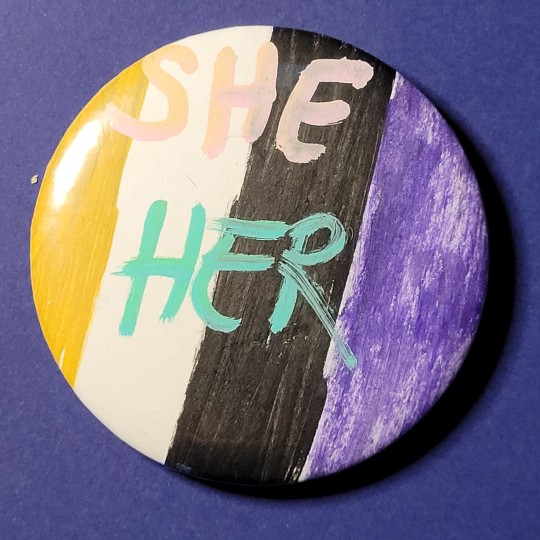
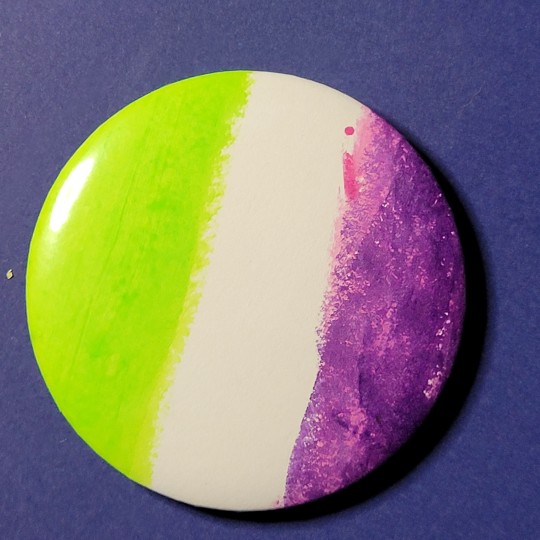
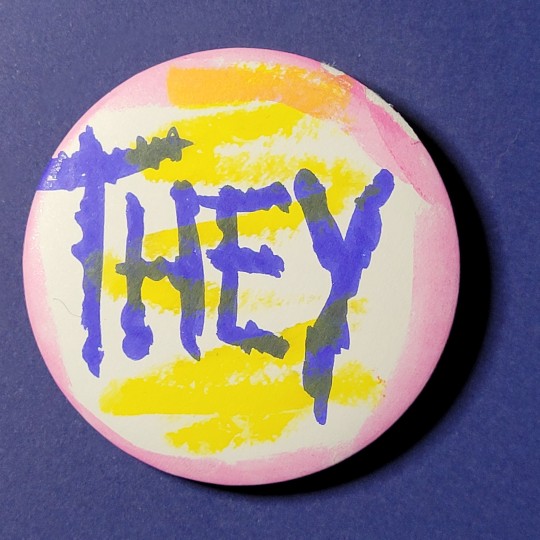
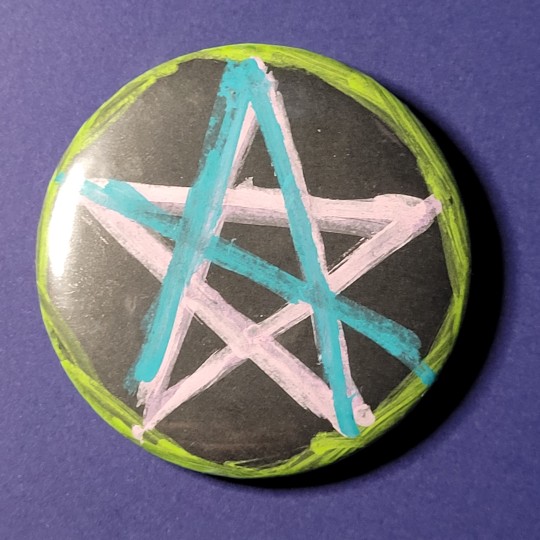
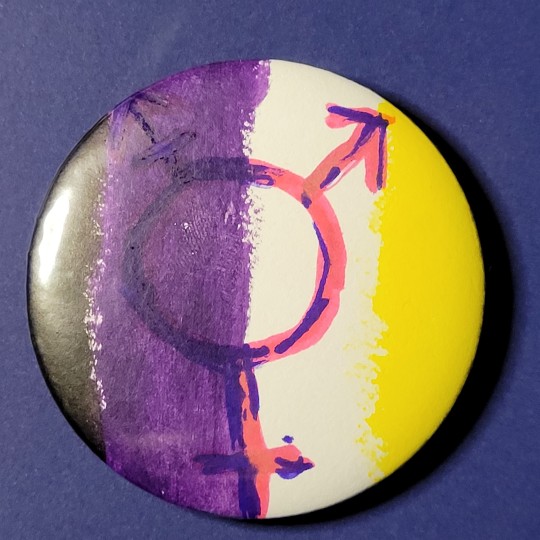

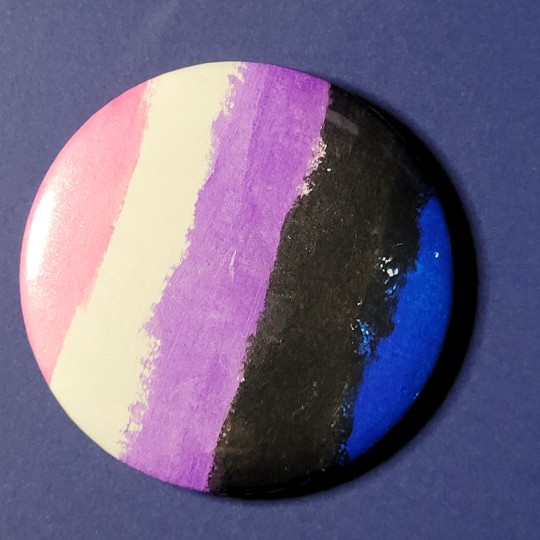
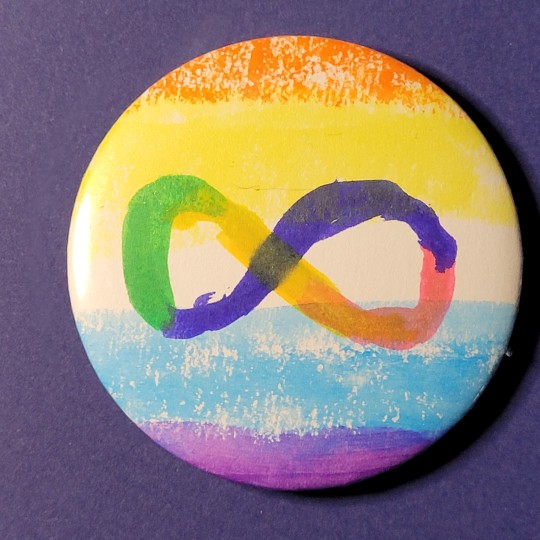
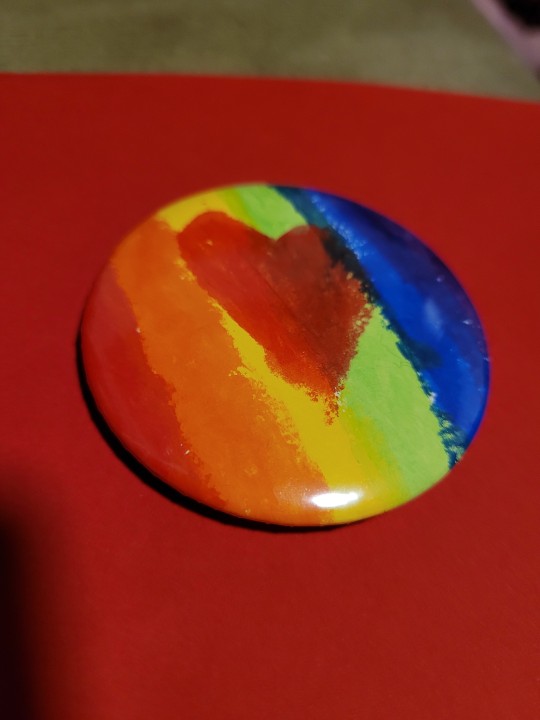
Badges I made over the last few weeks
#neuroqueer#pride#badges#trans rights#genderqueer#genderfluid#enby#art#various evidence#artist#evidence#love#witchblr#witchcore#witch anarchy#anarchy#pronouns
103 notes
·
View notes
Text
They say:
-You can't be AuDHDer because you are "normal".
-We're all a little autistic/ADHD.
-You can't be AuDHDer because you are queer and trans and you had s3x with your partner.
And stuff like that.
But when I don't mask, when I show autistic and ADHD joy, when I stim, when they see my special interests, they say I'm "weird", "childish" or "stupid".
When I show my difficulties, when I need support, when I have repetitive and racing thoughts, they say I'm "picky", "selfish", "spoiled".
When I have a meltdown or a shutdown, they say I'm "mad".
When they know that I am neurodivergent, they say I'm "ill".
I'm not ill, mad, spoiled, selfish, picky, stupid, childish or weird.
AuDHD is a disability, difficulty, joy, special interests, hyperfocus, mood swings, hypersensitivity, etc...
AuDHD is not an illness.
260 notes
·
View notes
Text
it is lovely weather here in autville this morning! as a result, everything Bad is hereby CANCELED. let us all gather in the meadows to frolic and stim!
#actually autistic#autism#autistic town#autistic things#autistic community#autism spectrum#autism acceptance#autistic#audhd#neuroqueer#neurodiverse#neurospicy#neurodivergent#neurodiversity#disability#disabled#disability pride#autistic pride#good day#good vibes
62 notes
·
View notes
Text
The amount of people from my neuropunk/madpunk/cpunk post that are like "Umm... well all of these EXCEPT paraphilias because those are BAD!" Do you realize the harm you're doing? That IS ableism my dude. Mad pride includes all stigmatized disabilities. If you can't align yourself with the liberation and support of all disabled people then DON'T align yourself with madpunk or cpunk or punk to begin with.
I won't even get into how not all paraphilias are disabilities rn either because then I'll have to explain all of that and watch it completely go over everyone's heads.
#mad punk#mad pride#cpunk#neuroqueer#neuropunk#ableism#disabilities#disability#disability awareness#actually mentally ill#disability pride#disability advocacy#paraphilia
25 notes
·
View notes
Text

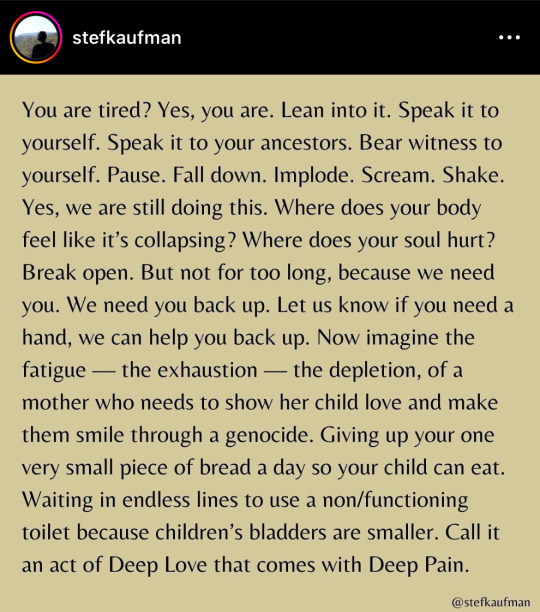
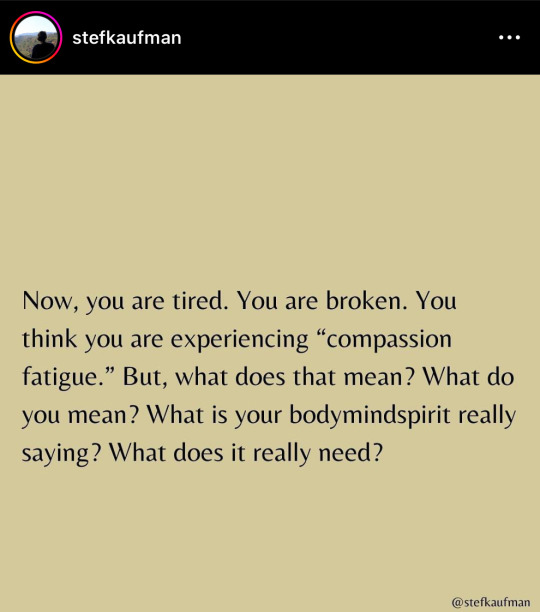
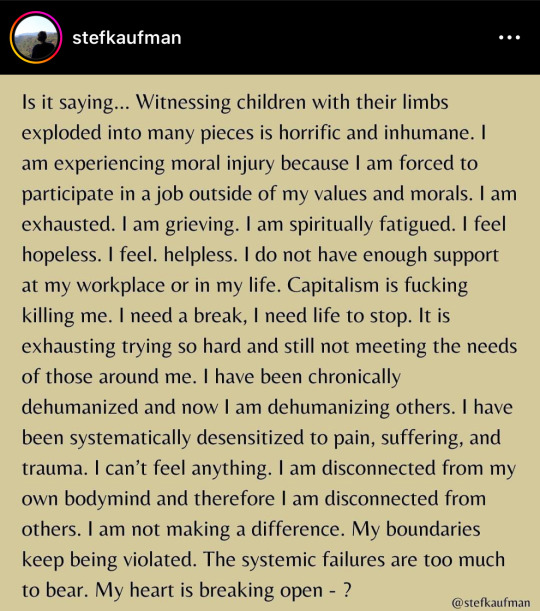


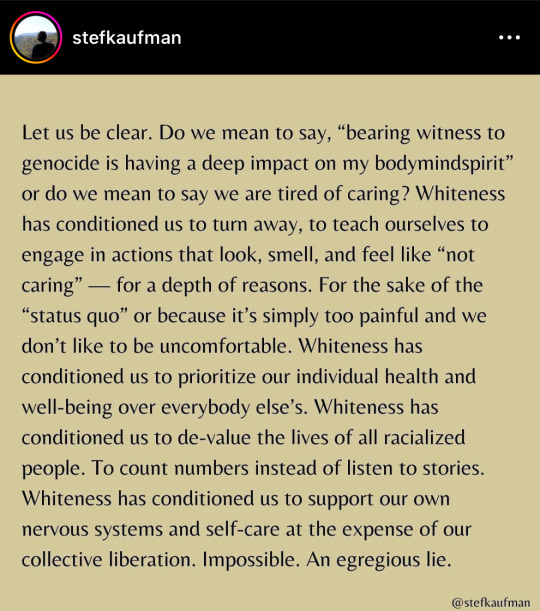
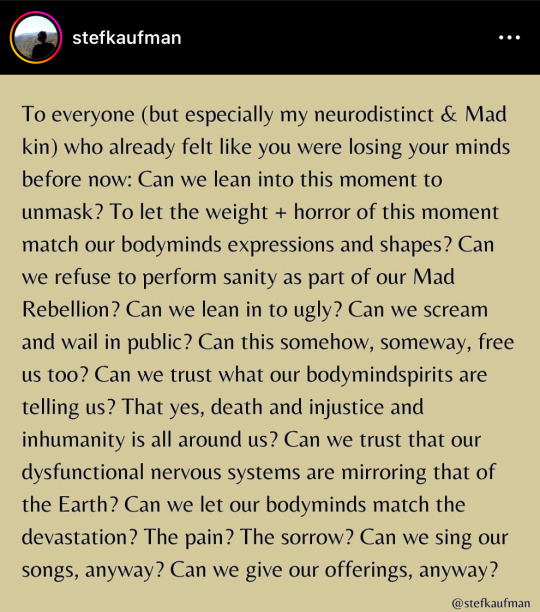
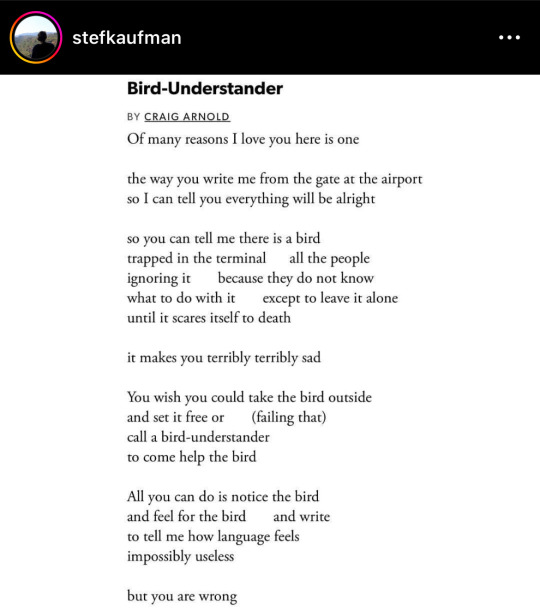
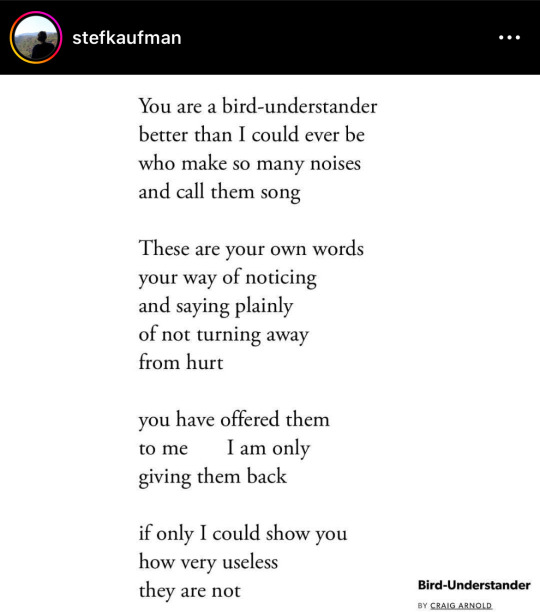
from the Jewish founder and director of ProjectLETS ^^
#instagram#resources#reaux speaks#undescribed#genocide#ethnic cleansing#compassion fatigue#compassion#free palestine#madness#neurodivergent#neurodiversity#neuroqueer#poetry#palestine#gaza#free gaza#ceasefire#jewish#judaism
49 notes
·
View notes
Text
Nick Walker on neuroessentialism in neuroqueer heresies: notes on the neurodiversity paradigm, autistic empowerment, and postnormal possibilities
Those who view neurodiversity through a neuroessentialist lens have an unfortunate tendency to compare and contrast neurotypicality with innate forms of neurodivergence like autism in a way that implicitly assumes autism and neurotypicality to be equally innate and equally intrinsic to a person's being. In the less well-informed discourses on neurodiversity that unfold on social media, for instance, one too often sees people speaking of "the neurotypical brain," as if neurotypicality were a biological destiny that unfolded inevitably from being born with a specific kind of brain.
On a strictly neurobiological level, there's not actually such a thing as a "normal brain" or a "neurotypical brain," any more than there's such a thing as a "male brain," a "heterosexual brain," or an "American brain." Neurotypical people aren't people who all share one distinct type of human brain, they're people whose compliance with prevailing cultural standards of neuronormative performance gains them the privileges that come with being considered "normal" within the dominant culture. Neurotypicality is more a social phenomenon than a biological one.
[...] some people have more innate capacity than others to adapt to the demands of neuronormative performance. But having that capacity isn't the same as being innately neurotypical. If we begin from the premise that neurotypicality is performative in the same sense that heteronormative gender roles are performative, then a newborn infant can't be legitimately considered neurotypical for the same reason a newborn infant can't be legitimately considered a straight cisgender female or a straight cisgender male: newborn infants are obviously not engaged in enacting acquired habits of performance.
Infants are adorable messy little bundles of possibility, and which possibilities become realized and embodied over time depends to a large extent on the nature of the actions that a given individual learns to perform. If the innate predispositions of a given infant are fundamentally incompatible with the demands of neuronormative performance, such that a life of comfortably and convincingly performing neuronormativity isn't within that infant's scope of future possibilities, then we can legitimately say that the infant is neurodivergent-i.e., it has already diverged from the path of neuronormativity, right at the outset.
The reverse, however, doesn't hold true. If the innate predispositions of a given infant are compatible with the demands of neuronormative performance, such that neurotypicality is within that infant's scope of future possibilities, that's not the same as the infant actually being neurotypical yet or being biologically destined for neurotypicality. To say that an infant is innately and "naturally" neurotypical just because it's capable of acclimating to a life of neuronormative performance makes no more sense than saying that the infant is innately and "naturally" a software engineer just because it would be possible to someday teach it to design software.
In other words, it's possible to be born neurodivergent but it's not possible to be born neurotypical.
#autism#neurodivergence#neuroqueer#just finished this book!!#it was really nice#and articulated some stuff that i really needed articulated clearly lol#thank youuu#i'll probably post more quotes later bc there was some suuuper good stuff in there#i also got authoring autism: on rhetoric and neurological queerness#so we'll see how that one goes! it's a little denser than neuroqueer heresies lol
73 notes
·
View notes
Text
now that i’ve deferred because a uni degree is nothing but an entrance ticket into moderate financial security and not worth utterly obliterating my mental health over i am compiling my own curriculum. all the posts i’ve ever tagged with #ref because they contain essays articles and other texts that i want to read but have never gotten around to, all that goes on the list. around fifty academic articles and book chapters downloaded onto my laptop from jstor while i still have access to it, tailored to fit my personal interests.
rearranging my self-education. little mx autodidact. carving out a passage through the brambles with a freshly sharpened machete. make no mistake, the thorns are piercing and will continue to tear at my exposed limbs, but the pain is worth the fruits of knowledge at the end, real knowledge and not something superimposed from above. i know, i know, undergrads aren’t afforded that freedom of narrowing our study, it’s something earned with time and effort and only fully permitted at a “higher” level of education, but who determines these levels?
it sounds silly and rash, but it’s a long-deliberated decision. the university environment is not right for my weird brain despite my literary inclinations, and i prefer to select my own path towards learning while working a low paying job on the side. perhaps i’ll return in a year’s time after all, matured and mellowed, hardened or roughened with real-life experience and online self-teaching, to pursue liberal arts as the most, well, liberated pathway. maybe not.
maybe if i had gone to one of those colleges where they allow you to pick and choose your own modules for your degree entirely (like one of the people that i most admire on this website did in its time) things would have gone down differently, but alas. let the world keep turning and let everything that serves no purpose any longer decompose and compost into something new .
“what has this got to do with autism?” you may ask, “i’m autistic and i completed a normal bachelors’ degree just fine.” your answer: having been in a place of moderate autistic burnout for years that abruptly turned severe in the past few months, my bodymind has shifted into what is known rather disparagingly under the medical model as “autistic regression” or “regressive autism”: a gradual distancing further and further away from accepted neurotypical standards of moving through and navigating the world around me.
one of the ways in which this unmasking presents itself, apart from the more noticeable characteristics such as outwardly visible stimming and a complete absence of eye contact, is a total inability to focus on, be motivated by and/or engage in any (textual, literary, cinematic etc etc) materials that do not connect at least tangentially or superficially with my special interests (that being ghosts/hauntings, hauntology, folk horror, lovecraftiana/cosmic horror, horror in general, the gothic, neurodiversity, alternative music; narratives/storytelling, folklore/fairytales; queer theory; carceral abolition and liberation; and a few other subjects here unlisted). according to normative capitalist logic of usefulness and productivity, that makes me “severely disabled” by virtue of “restricted interests”. i would say it makes me a interesting person with tall twisted tales to tell, but nevermind that silly nonsense, it’s a mad person speaking.
at this present moment i have no motivation, wish nor desire to continue wasting time and energy attempting to study and remember things that do not connect with the key concepts that my mind is constantly orbiting around. if that makes me incurious or annoying or limited, so be it — this neurological difference affects every aspect of my personality and i do not wish to change it. if the world around us refuses to change, we must either alter it ourselves or construct our own pathways out of the shadows and into the moonlit garden.
#thank you cavar sarah for directly/indirectly inspiring me to make this (highly personal yet hopefully informative to some?) post!!#@librarycards on here#aer writing on transMadness and adjacent topics gives me life and constant material for thought and consideration#jamie.txt#uniposting#autism#actually autistic#neurodiversity#neuroqueer#autpunk#disability#autistic#autism acceptance#college dropout#autistic burnout
50 notes
·
View notes
Text
what’s dysgeographica?
dysgeographica, also known as developmental topographical disorientation, is a form of neurodivergence in which a person has difficulty creating mental maps, orienting themselves or a location in space, and navigating from place to place.
some common symptoms of dysgeographica include:
getting lost easily, even in one's own neighborhood or other extremely familiar locations
difficulty memorizing even simple or frequently traveled routes
no internal compass (i.e. no sense of which way one is facing or if one has been turned around)
no sense of where familiar locations are in relation to each other
difficulty making a mental map of a building or area's layout
uncertainty about which direction a location is in, even if one knows how to get there
complete reliance on GPS navigation while traveling
rigidly following one familiar route to get somewhere, even if a better route may be available
anxiety around driving a car due to lack of confidence in one's ability to navigate as the driver
is dysgeographica just a poor sense of direction?
while many people struggle to read maps or navigate unfamiliar places, being dysgeographic means struggling with very familiar locations as well as unfamiliar ones, potentially getting lost in one's own neighborhood or workplace.
additionally, while someone who just has a poor sense of direction will generally still be able to move through the world and perform daily life activities with little to no added difficulty or distress, dysgeographic people will often find that their difficulty navigating makes day-to-day functioning more difficult (e.g. being late to work regularly due to getting lost, not being able to drive a car or travel alone).
is dysgeographica part of adhd/autism/etc?
it is possible to have dysgeographica with comorbid autism, adhd, dyslexia, dyscalculia, dyspraxia, etc. it's also possible to experience dysgeographic symptoms as secondary to one of those (e.g. having trouble navigating due to adhd inattention).
that being said, dysgeographica is not inherently connected to any other form of neurodivergence, and can be the only neurodivergence someone has. you don't need to be diagnosed with anything else to have dysgeographica.
is dysgeographica a disability?
yes, dysgeographica is a neurodevelopmental disability.
it is not, however, recognized as such by the DSM or ICD, despite research showing evidence of its existence and the impact it can have on people's lives. that doesn’t mean it’s not a real disability — what it does mean is that it can be very difficult (if not impossible) to get accommodations.
while dysgeographica would most likely not be categorized as a specific learning disability, it does have some overlap with dyscalculia and dyslexia, and can be considered a “cousin” of the specific learning disabilities much in the same way as dyspraxia.
#resource#dysgeographica#actually dysgeographic#developmental topographical disorientation#neurodivergent#actually neurodivergent#neurodivergent community#neurodiversity#neuroqueer#neurospicy#developmentally disabled#developmental disabilities#neurodevelopmental disorders#disability education#disability awareness#disability community#disability#directionally challenged#sense of direction
243 notes
·
View notes
Text
Yep, I am visible today.
I’ve known I was some flavour of non-straight since I was, what, nine? Ten? I assumed I was a lesbian for a long time and was assumed to be one at school; I came to even a pretty minimal understanding of what bisexuality was a lot later than that. At my school, I don’t really think there was a huge clarity in the distinction between sexuality and gender; a lot of the crap that came my way then was sort of overtly homophobic but had a lot of transphobic undercurrents, if that makes sense?
Section 28 *really* did a number on the information available to me as an undiagnosed autistic kid in middleish class Scotland - I think I actually first came across it in one of my Dad’s Robert Silverberg novels when I was about 13, which both scandalised me with its very frank descriptions of p in v sex and utterly intrigued me with a “…so there are people who like, *like* everyone? Is this a thing?”
I don’t think I started really accepting it in myself until I was in my early-mid twenties - there was a lot of stray “you can’t be bi; you have a boyfriend” at uni which made me go around the old and *ridiculously well-worn “am I a lesbian just kidding myself?” wheel quite a few more times.
There was always the *other* thing in there which I know now was gender stuff - and of course neurodivergence is inherently mixed up with that, which is one of the main reasons I’m leaning more and more towards accepting myself as autigender/neuroqueer in gender stuff.
But all that’s for another day. Today is a day I am proud to be able to acknowledge myself as a bisexual person #bivisibilityday 💙💗💜
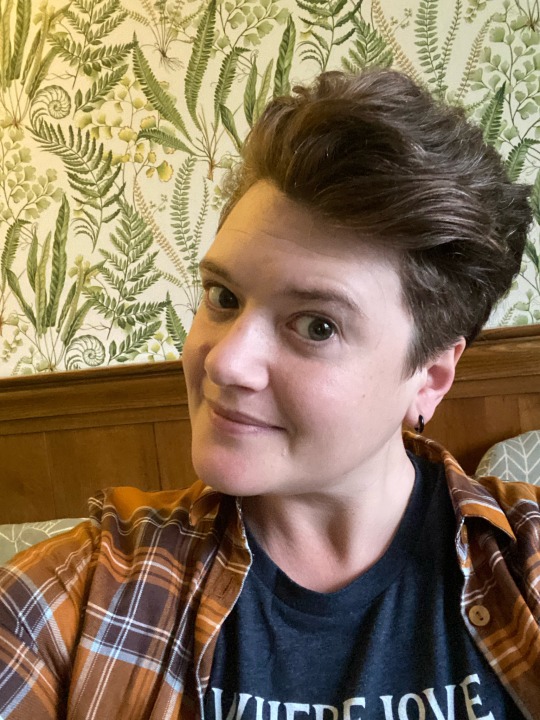
#bi visibility day#bisexual#bi nonbinary#queer#visible today!#section 28#autistic adult#neuroqueer#autigender
42 notes
·
View notes
Text
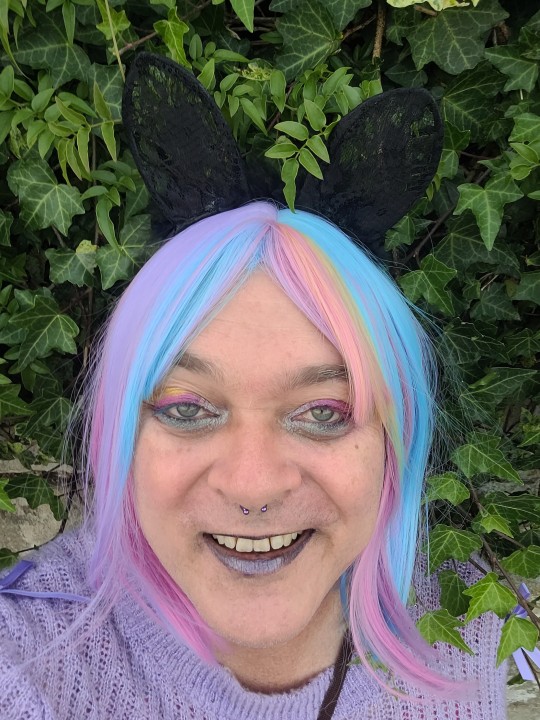

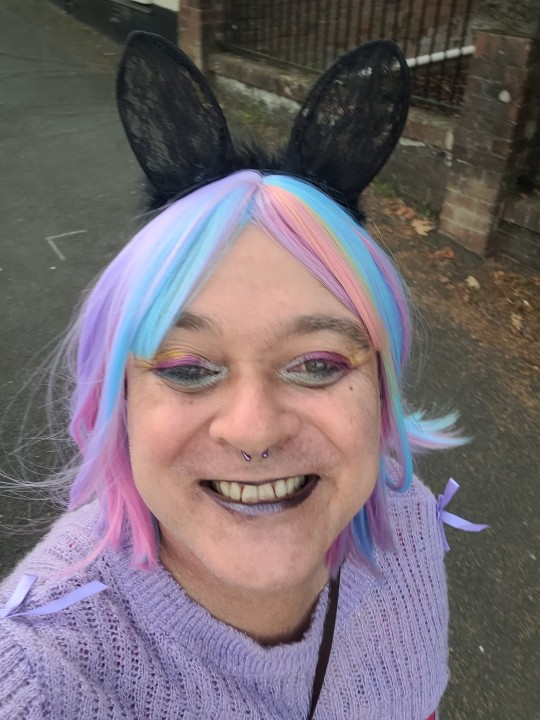
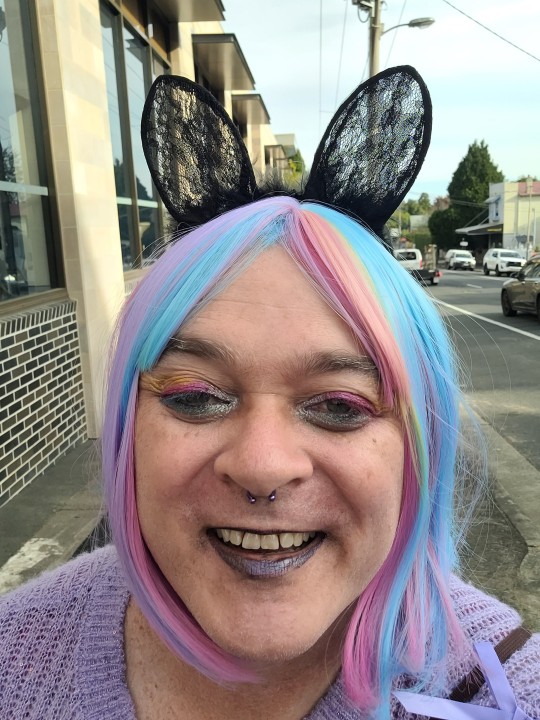

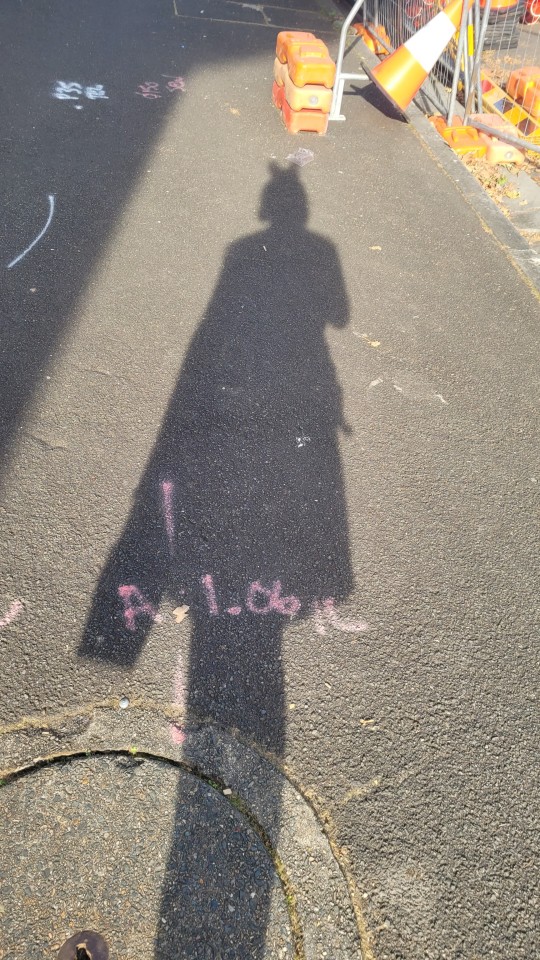
Trans Day of Visibility!
Love to all trans, nonbinary, agender, genderfluid, genderfae, genderqueer... all of you folks! You are loved
#tdov#trans pride#transgender#enby pride#art#artist#various evidence#love#evidence#agender#neuroqueer#genderfluid#genderfae#genderpunk#genderfuck#genderqueer#enby#nonbinary
34 notes
·
View notes